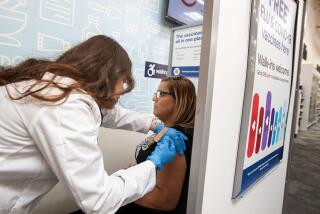In a rush? It’s OK to double up on shots
- Share via
Travelers who book a trip out of the country at the last minute -- or who are plain old procrastinators -- often face a dilemma: They need multiple vaccinations, and they’re running out of time.
The results of a new study may ease the time crunch for them. Most travelers can receive multiple vaccinations without too many side effects, according to a study by a German research team published in the March-April issue of the Journal of Travel Medicine. The number of side effects increases with multiple vaccinations, but they aren’t generally severe or incapacitating, the study found.
Dr. Tomas Jelinek, a tropical medicine expert at the University of Munich, and his colleagues evaluated 1,035 travelers who went to the university travel clinic for vaccinations. Those who got single or multiple vaccinations completed a questionnaire about side effects. They were inoculated against yellow fever, hepatitis A and B, typhoid, meningococcal disease, Japanese encephalitis, tetanus, diphtheria and polio.
Jelinek asked them about local side effects, such as pain at the point of injection, itchiness or impaired use of the arm, and whole-body or systemic side effects, such as fever, malaise, headache or intestinal problems.
Of those who got only one shot, 42.6% suffered side effects. Almost 37% of those who got double vaccinations reported side effects; 40.3% of those who got three shots did.
And half of those who got more than three at once reported side effects, although that group rated the severity of those reactions as comparatively low. The most frequent complaint was fatigue.
Travelers older than 60 reported fewer side effects. Those with allergies reported more.
Jelinek concluded that multiple vaccines generally were well tolerated, but he added a caveat: Those with autoimmune diseases, such as lupus, Graves’ disease and other disorders, should be wary of multiple vaccinations. “Vaccines, especially multiple vaccines, may trigger a new episode,” he said.
The study results make sense to Dr. Terri Rock, a Santa Monica physician who specializes in travel medicine. Especially in Los Angeles, she said, where getting to the doctor’s office, plus finding a place to park, can eat up hours, “there’s no reason to split these up,” providing a patient is in good health and has no other reasons not to double up.
*
If you’re traveling to a foreign country where you don’t speak the language, be sure to take a list of English-speaking doctors or your own doctor’s referral.
Among the resources:
* The State Department’s Bureau of Consular Affairs Overseas Citizens Services. If you’re an American citizen and are seriously ill or injured abroad, a U.S. consular officer can help you find appropriate medical services and let family and friends know. Details are on the site at www.travel.state.gov/medical.html.
* The International Assn. for Medical Assistance to Travelers is open to anyone. Members get a directory of English-speaking physicians, specialists, clinics and hospitals in 125 countries. Providers agree to a set payment schedule. (Daytime office visits, for instance, cost $55.) Membership is free, but a donation is requested. For details, see the site at www.iamat.org.
Healthy Traveler appears twice a month. Kathleen Doheny can be reached at kathleendoheny
@earthlink.net.
More to Read
Sign up for The Wild
We’ll help you find the best places to hike, bike and run, as well as the perfect silent spots for meditation and yoga.
You may occasionally receive promotional content from the Los Angeles Times.






